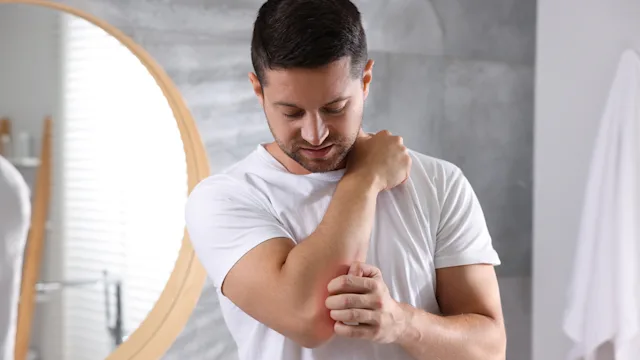Key takeaways:
Itchy skin has several causes, including diseases of the skin, medications, allergic reactions, and medical conditions.
Dry skin is one of the most common causes of itchy skin. Treatment options include moisturizing, avoiding triggers, and minor changes to your personal hygiene routine.
Most of the time, itchy skin isn’t a sign of anything serious. But there are cases when you should contact a healthcare professional.
Itchy skin, known as “pruritus,” is a common complaint. Chronic itch refers to itchy skin that lasts for 6 weeks or longer. It’s common, and it’s more likely to happen with increasing age: Up to 78% of older adults have experienced chronic itch.
Although it can be uncomfortable, itchy skin usually isn’t a sign of something severe. So you can often treat it at home. But in some scenarios, itchy skin may be a sign of a more serious medical condition. We’ll cover common causes of itchy skin as well as how to treat it at home and recognize the signs that itchy skin might be more severe.
What are the most common causes of itchiness?
There are several skin conditions and other nonskin health conditions that can cause itchy skin. Other causes can include environmental exposures, certain food allergies, and specific products. We’ll cover common causes of pruritus in more detail.
Dry skin
Dry skin is the most common cause of itchy skin. There are several causes and risk factors for dry skin:
Cold, dry air
Sunburn
Indoor heat
Repeated and frequent exposure to water, like handwashing or a job that involves working in water
Certain medications, like acne treatments and antidepressants
Age over 60 years
Darker skin tones
Smoking
Skin conditions
Besides dry skin, other skin conditions that cause itchiness include:
Sensitive skin
Allergic reactions, like contact dermatitis or dermatographia
Eczema (atopic dermatitis)
Insect bite reactions, like mosquito bites or lice
Viral rashes, like shingles or chickenpox
Other health conditions
Although it’s less common, some medical conditions can cause itchy skin. People with the following health conditions are more likely to experience pruritus:
Blood disorders, like hemochromatosis
Autoimmune conditions, like Sjögren’s disease or multiple sclerosis
Formication, or a skin crawling feeling
Medications
Medications can cause itchiness, especially in older people. Here are just a few examples:
Some antibiotics, including sulfamethoxazole / trimethoprim (Bactrim), macrolides, and penicillins
Statins (cholesterol-lowering medications)
Some blood pressure medications, including calcium channel blockers, ACE inhibitors, and beta blockers
Opioid pain medications
Cancer treatments, such as immunotherapy and radiation
What’s the difference between psoriasis and eczema? These skin conditions have some similarities, but these images can help you tell them apart.
Causes of dry skin: Learn how aging, medical conditions, and even personal hygiene habits can damage the skin barrier and cause dry skin.
What is the skin barrier? It’s the outermost layer of your skin that holds in water and oils, and keeps out irritants and toxins. And there are ways to strengthen it.
Allergies
Allergies from your environment can also cause itchy skin. These may include:
Pet dander
Pollen
Air pollution
Dust
Mold
Certain food allergies may also cause itchy skin. These are the most common food allergens:
Cow’s milk
Eggs
Peanuts
Sesame
Shellfish and fish
Soy
Tree nuts
Wheat
Read more like this
Explore these related articles, suggested for readers like you.
Household irritants
Several products can cause itchiness, either through skin irritation or an allergic reaction. These include:
Nickel
Perfumes
Soaps and detergents
Latex
What are the best treatments for itchy skin?
The best treatment depends on the cause. For example, there are specific treatments for psoriasis skin rashes. If your itching is due to an allergy, it’s best to identify it so you can avoid it as much as possible. Your healthcare team can help you figure out the cause of your itching if you’re struggling to make sense of it.
That said, there are some general tips for dealing with itchy skin.
Gentle washing
When possible, try to avoid harsh scrubbing and soaps. If you must use soap, try to choose a fragrance-free, mild bodywash. Your primary care provider or dermatologist may recommend washing with gentle, hypoallergenic cleansers or taking oatmeal baths. You can help avoid skin irritation by shortening showers, using warm instead of hot water, and patting your skin gently when drying off.
Moisturizing creams and ointments
A healthcare professional might recommend products with certain ingredients, such as:
Emollients
Hyaluronic acid
Glycerin
Ceramides
These products work well to treat dry skin by softening dry skin and locking in moisture. You should massage moisturizers into your skin several times per day, or as often as your healthcare team recommends. It’s best to use moisturizing creams and ointments right after you shower or take a bath — and after washing your hands. This makes sure the cream or ointment stays on the skin and prevents water from washing it off.
Avoid fragrances and irritants
There are certain ingredients that may cause more irritation and itching. If you have sensitive skin, it’s best to avoid products that include:
Preservatives (like methylchloroisothiazolinone / methylisothiazolinone)
Metals (such as nickel)
Hair dyes (like paraphenylendiamine)
Medications
Oral antihistamines can help relieve itchiness. Many antihistamines are available over the counter (OTC), such as fexofenadine (Allegra) and cetirizine (Zyrtec). But it’s important to note that some people experience intense itching after stopping Zyrtec. This is more likely after taking it for a long time. If this happens, ask a healthcare professional for guidance.
Other options include OTC anti-itch creams or steroid creams like hydrocortisone. If OTC medications aren’t enough, prescription medication might be helpful. These include creams, ointments, or oral medications such as prednisone.
Other at-home treatments for itchiness
Here are some other tips to consider for itchy skin:
Don’t scratch, even though it may seem impossible. Avoiding scratching is one of the best things you can do for your skin. That’s because scratching can lead to skin breakage and infection.
You might also consider using a humidifier in your home, especially in the winter when the heat often kicks up. This will help keep your skin hydrated, even in dry air.
If your job involves water or you’re often in cold weather, try to wear gloves when possible.
In warmer months, use sunscreen and wear protective gear to prevent sun damage. This can also help to avoid itchy skin from a sunburn.
Applying cold compresses can help soothe itchy areas of your skin.
Looser fitting, cotton clothing can help your skin breathe and make you feel more comfortable.
How do I know if my itchiness is a sign of something serious?
Contact your healthcare team if you have itchiness that won’t go away despite home remedies. Some redness or scaliness may be normal, but get help sooner if you have signs of infection in your skin. These signs might include:
Skin color changes
Warmth
Oozing
Blistering
Rash
Swelling
Pain
When to see a healthcare professional
Get medical attention if you have signs of infection or any of the following symptoms. These can indicate a more serious condition:
Fever
Abdominal pain
Nausea or vomiting
Dizziness
Cough, wheezing, or shortness of breath
Any swelling in the face, throat, or tongue
Yellowing of the skin, eyes, palms, or soles of the feet
You should also speak with a healthcare professional in these situations:
If you’re pregnant and have itchy skin that you didn’t have before your pregnancy: Itchy skin while pregnant could be a sign of something more serious like infection or liver disease.
If your skin is suddenly itchy after starting a new medication or treatment: This may be a side effect from the medication. Talk with your healthcare team about whether you should continue the medication or try something else.
If you think you have an allergy but can’t quite pin it down: It can be helpful for experts to help you figure out what’s going on and whether you need treatment.
Frequently asked questions
Itching due to liver problems typically affects the palms of the hands and soles of the feet. But liver disease can also cause generalized itching, or itching all over.
Yes. Stress can cause hives, sometimes called “stress rash,” which can be very itchy. Stress can also flare other conditions that cause itching, including eczema and psoriasis.
Itchy skin at night is common. It can disrupt your sleep and affect your quality of life. Experts aren’t entirely sure why this happens, but there are a few possible reasons. They include changes in body temperature, increased water loss from the skin, and hormonal changes at night.
Itching due to liver problems typically affects the palms of the hands and soles of the feet. But liver disease can also cause generalized itching, or itching all over.
Yes. Stress can cause hives, sometimes called “stress rash,” which can be very itchy. Stress can also flare other conditions that cause itching, including eczema and psoriasis.
Itchy skin at night is common. It can disrupt your sleep and affect your quality of life. Experts aren’t entirely sure why this happens, but there are a few possible reasons. They include changes in body temperature, increased water loss from the skin, and hormonal changes at night.
The bottom line
Itchy skin is quite common. Medical conditions, medications, and irritants can contribute to itchy skin. While itchy skin is uncomfortable, you can make changes to your daily routine to help relieve your discomfort. Things like eliminating triggers, using the right moisturizer, and using a humidifier can help relieve itchy skin. Your healthcare team may suggest that you try OTC creams and medications. Contact them if your itchiness doesn’t improve or you experience more serious symptoms like rash, fever, or swelling.

Why trust our experts?



References
Allergy & Asthma Network. (n.d.). Food allergies.
American Academy of Dermatology Association. (n.d.). Dry skin: Who gets and causes.
Chung, B. Y., et al. (2020). Pathophysiology and treatment of pruritus in the elderly. International Journal of Molecular Sciences.
Every Stage Health. (2022). Skin conditions during pregnancy. American College of Obstetricians and Gynecologists.
Grady, J. (2024). Scratching the itch: Management of pruritus in cholestatic liver disease. Liver Fellow Network.
Huang, A. H., et al. (2019). Pruritus associated with commonly prescribed medications in a tertiary care center. Medicines (Basel, Switzerland).
Lavery, M. J., et al. (2016). Nocturnal pruritus: The battle for a peaceful night’s sleep. International Journal of Molecular Sciences.
Luddman, P. (2024). 10 reasons your skin itches uncontrollably and how to get relief. American Academy of Dermatology Association.
Luddman, P. (2025). Dermatologists’ top tips for relieving dry skin. American Academy of Dermatology Association.
Rupert, J., et al. (2022). Pruritus: Diagnosis and management. American Family Physician.
Szczęch, J., et al. (2017). Prevalence and relevance of pruritus in pregnancy. Biomed Research International.
Tivoli, Y. A., et al. (2009). Pruritus: An updated look at an old problem. The Journal of Clinical and Aesthetic Dermatology.
Weisshaar, E. (2021). Itch: A global problem? Frontiers in Medicine.















